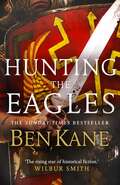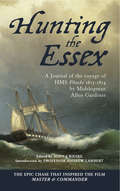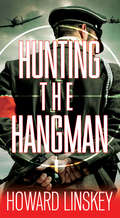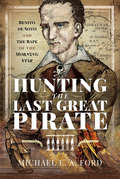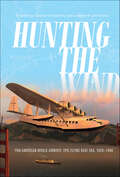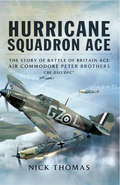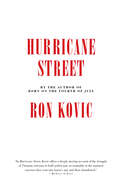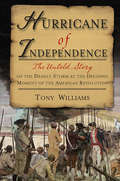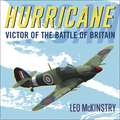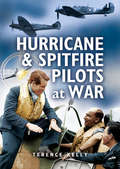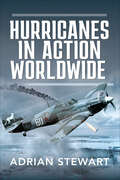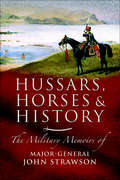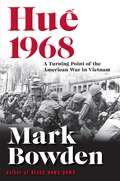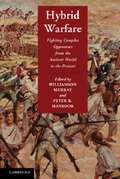- Table View
- List View
Hunting the Eagles (Eagles of Rome #2)
by Ben KaneFrom 'the rising star of historical fiction' (Wilbur Smith) a new Eagles of Rome novel, by the Sunday Times bestselling author of Eagles at War.JUSTICE , HONOUR, REVENGE AD 14: Five long years have passed since the annihilation of three legions in the wilds of Germania. Demoted, battle-scarred and hell-bent on revenge, Centurion Tullus and his legionaries begin their fightback. Ranged against them is the charismatic chieftan Arminius, determined to crush the Romans for a second time. Convinced that the eagle belonging to his old legion is close at hand, Tullus drives ever deeper into enemy lands. But with Arminius and his warriors closing in on the Romans, a murderous battle is about to begin…
Hunting the Essex: A Journal of the Voyage of HMS Phoebe, 1813–1814
by Midshipman Allen GardinerIn February 1813 the British frigate Phoebe set out on a secret mission that would involve sailing halfway around the world to attack American settlements in the Pacific Northwest. The United States, frustrated at the treatment of its shipping by the combatants in the Napoleonic Wars, had finally opened hostilities against the British in the previous June. From the American perspective the War of 1812 began with disasters in its invasion of Canada, but against all expectations the infant US Navy had scored significant victories at sea. The most strategically significant of these was the campaign by the frigate USS Essex, which had almost annihilated the lucrative British whaling trade in the south Pacific. Therefore, Phoebe was diverted to hunt down and destroy this highly successful commerce-raider. After an epic search, Phoebe tracked her prey to neutral Valparaiso where the American frigate was blockaded and,in a very bloody battle, eventually captured. The American captain, David Porter, published a self-serving account of his actions which ever since has mired the battle in controversy, so this British naval eyewitness account is an important counter-balance. It is one of the lesser-known campaigns of a war which is currently celebrating its bicentenary, but its inherent drama inspired the plot of Patrick O'Brian's novel The Far Side of the World, although in its movie adaptation Master & Commander the American frigate is transformed into a French privateer.
Hunting the Hangman
by Howard LinskeyWhat an entire army couldn&’t do, two men must: take out the Butcher of Prague.Operation Anthropoid has been engaged. 1941. The Third Reich is at its zenith. Its protector is Reinhard Heydrich, the most merciless senior figure in Hitler&’s inner circle, and the Fuhrer&’s eventual successor. Under Heydrich&’s oppressive command, thousands of lives have already been erased in Czechoslovakia&’s capital. It&’s only Heydrich&’s first ruthless step in service to the German people. Heydrich&’s ultimate endgame is the Final Solution. But under the cloak of night, the resistance conspires as well. Trained in subterfuge by the British Special Operations, Josef Gabcik and Jan Kubis are unfailingly dedicated soldiers. Now, as committed allied agents they&’ve been tasked with an audacious and seemingly impossible mission: parachute into an occupied city in lockdown, rally the remaining Czech rebels, and assassinate one of the most dangerous men alive. Outmanned against insurmountable odds, Gabcik and Kubis have no choice but to succeed. The fate of Europe and the world is in their hands. High Acclaim for Ungentlemanly Warfare &“A stellar novel of high-octane action, adventure and suspense.&”—Steve Berry, New York Times bestselling author &“Reads like the new The Day of the Jackal—swift, deadly, game over!&”—John Ellsworth, USA Today bestselling author of The Point of Light &“A heart-pounding thriller from cover to cover. I couldn&’t put it down.&”—James D. Shipman, author of Task Force Baum &“A perfect companion for fans of the great Ken Follett.&”—Chuck Driskell, author of Final Mission: Zion
Hunting the Last Great Pirate: Benito de Soto and the Rape of the Morning Star
by Michael Edward FordA true, century-spanning saga of terror at sea, a dramatic trial, and a mystery at long last solved . . .In 1827 the Duke of Wellington—former Commander-in-Chief of the British Army and British Prime Minister—ordered the withdrawal of British soldiers from the island of Ceylon after years of bloody conflict there. English cargo vessels, including the unarmed English Quaker ship Morning Star, were dispatched to sail to Colombo to repatriate wounded British soldiers and a cargo of sealed crates containing captured treasure. By January 1828, Morning Star was anchored at Table Bay, Cape Town, before joining an armed British convoy of East Indiamen heading north. Heavily laden, she struggled to keep up with the ships ahead. But a heavily armed pirate ship and its master, the notorious Benito de Soto, were lying in wait off Ascension Island in the mid-Atlantic to pick off stragglers from passing convoys. This book tells the full story of how Morning Star was easily overhauled by the pirate and stopped with cannon fire, the bloody events that followed, the long quest to hold de Soto to account—and the remarkable discovery that was made nearly a century later.
Hunting the Nazi Bomb: The Special Forces Mission to Sabotage Hitler's Deadliest Weapon
by Damien LewisA &“gripping&” and &“heart-stopping&” account of the combined Norwegian and British sabotage raids to stop Hitler from making an atomic bomb (Saul David, Evening Standard). Nothing terrified the Allies more than Adolf Hitler&’s capacity to build a nuclear weapon. In a heavy water production plant in occupied Norway, the Führer was well on his way to possessing the raw materials to manufacture the bomb. British Special Operations Executive (SOE)—Churchill&’s infamous &“Ministry of Ungentlemanly Warfare&”—working with the Norwegian resistance executed a series of raids in the winter of 1942–43, dropping saboteurs to destroy Hitler&’s potential nuclear capability: operations Musketoon, Grouse, Freshman, and finally Gunnerside, in which a handful of intrepid Norwegians scaled a 600-foot cliff to blow the heavy water plant to smithereens. Nothing less than the security of the free world depended on their success. The basis for the movie, The Heroes of Telemark, starring Kirk Douglas and Richard Harris, this true story is more harrowing than any thriller, and &“Lewis does the memory of these extraordinary men full justice in a tale that is both heart-stopping and moving&” (Saul David, Evening Standard).
Hunting the Truth (National Forest K-9 #2)
by Kathleen Donnelly&“Hide, Maya. Don&’t let the bad people find you.&”Those are the last words Forest Service law enforcement officer and K-9 handler Maya Thompson ever heard her mother say.Returning to the Colorado mountains, ex-soldier Maya is no longer a scared little girl. She&’s here to investigate her mother&’s cold case, but fear creeps in when it comes to her personal life—things are getting serious with sheriff deputy Josh Colten.After new DNA evidence surfaces, both her beloved grandfather and Josh warn her away from the case, suspecting that she could be the next victim. But Maya doesn&’t listen.Instead, Maya and her K-9 partner, Juniper, track a suspect deep into the forest and directly into grave danger…National Forest K-9Book 1: Chasing JusticeBook 2: Hunting the Truth
Hunting the Wind: Pan American World Airways' Epic Flying Boat Era, 1929–1946
by Teresa Webber Jamie DodsonTake your seats, and by all means, fasten your seat belts! Come on a journey back in time to aviation’s most daring and innovative era. Travel back nine decades, when for the first time, airplanes determined the victors of global wars—a time that altered the course of the world. Hear never-before-told true stories penned by still-living flight crew members and passengers. Learn about the remarkable men, women, and aircraft builders who launched an aviation phenomenon. Thrill to the romance, adventure, and danger air travelers encountered flying to far-flung, exotic lands. Marvel at art deco air terminals, the world’s only flying-boat museum, and onboard luxuries rivaling five-star hotels. Like mythical Camelot, it was a brief, shining moment. But this was no myth. It was an extraordinary point in global history when Pan American’s quintessentially magnificent flying boats ruled the skies.
Hurricane Aces 1941-45
by John Weal Andrew ThomasThe Hurricane saw widespread action with Allied forces, as the RAF's first monoplane fighter. This book describes its many feats throughout 1945. It served as a fighter-bomber on the Channel Front, where the American Eagles and Polish units were amongst the Fighter Command squadrons flying the Hurricane, and where some of its highest-scoring aces operated. The Sea Hurricane was the principal fighter deployed by the Fleet Air Arm in the Mediterranean, and Hurricane units continued to operate from bases in India and Ceylon until 1945, following their failure to defend Singapore and Malaya from the Japanese.
Hurricane Katrina: Lessons for Army Planning and Operations
by Lynn E. Davis Agnes Gereben Schaefer Gary Cecchine Laurinda L. Zeman Jill Rough Laurinda L. RohnThe efforts undertaken by civilian and military organizations in response to Hurricane Katrina were historically unprecedented, but a number of changes would enhance future Army and National Guard disaster-response efforts, including preparing governors to call up Guard units for out-of-state emergencies and the creation of regional standing homeland security task forces.
Hurricane R4118 Revisited: The Extraordinary Story of the Discovery and Restoration to Flight of a Battle of Britain Survivor: The Adventure Continues 2005–2017
by Peter Vacher&“Peter Vacher has revised and updated his classic account of the discovery and restoration of our Hawker Hurricane Mk I-R4118.&” —Hurricane Heritage Twelve years since the amazing account of Peter Vacher&’s discovery in India was originally published, Grub Street is thrilled to bring readers the updated story of Hurricane R4118. Since the restoration of this magnificent aircraft to flight in 2004, Peter Vacher continued to research its history. In Hurricane R4118 Revisited, more stories of R4118&’s origins are told, including the extraordinary tale of how this aircraft shot down a friendly Whitley bomber before it was assigned to a RAF squadron. Focus is also given to the role of 605 Squadron&’s ground crew and the aircraft during the Battle of Britain. Continuing into the present day, Vacher highlights the challenges of maintaining and flying a historic warbird, while Keith Dennison, a warbird pilot, provides expert commentary on exactly what it is like to fly a Hurricane. The book concludes with the sale of R4118 to an enthusiastic Englishman and the decision taken to keep the aircraft at the Shuttleworth Collection. With brand new photography and sources, including wartime letters from veteran pilot Bunny Currant, this book is essential reading for all Hurricane enthusiasts.&“Photos and firsthand accounts trace the ongoing restoration and display of a legendary aircraft.&” —FineScale Modeler
Hurricane R4118: The Extraordinary Story of the Discovery and Restoration of a Great Battle of Britain Survivor
by Peter Vacher Bob FosterA fascinating account of the only airworthy Hawker Hurricane, &“now regarded as the most historic British aircraft to survive in flying condition from WW2&” (FLYER). In 1982 when he was traveling in India, Peter Vacher stumbled on the remains of a British plane—a Hurricane Mark I, a veteran of the Battle of Britain. It was in a dreadful state. Could he restore it? Would it fly again? Not until 14 years later did he decide to act and after six years of wrangling he got the icon home. Then the truly difficult process of restoration began—a worldwide search for parts, careful reconstruction, flight testing—-until in 2005 it flew again to the delight of thousands of enthusiasts. Along the way Peter reunited three auspicious veterans—Peter Thompson, Bunny Currant, and Bob Foster—with R4118, men who had flown her during the war. To this day, the aircraft&’s grace and splendor in flight is enjoyed by crowds across the UK.&“The amazing story of how this only surviving Hurricane from the Battle of Britain was discovered and lovingly restored.&” —The Mail on Sunday
Hurricane Squadron Ace: The Story of Battle of Britain Ace, Air Commodore Peter Brothers, CBE, DSO, DFC and Bar
by Nick Thomas“The story of one of the most heroic fighter aces of the Second World War . . . has been brought to life in this gripping new book.” —Lancashire Living MagazineAir Commodore Peter Malam “Pete” Brothers CBE, DSO, DFC, and Bar (1917-2008) was one of the most highly praised pilots of the Second World War. Decorated extensively, he secured a total of 16 “kills” over the course of the conflict, with 10 of these occurring during the Battle of Britain. Pivotal moments in his career include the time, in August 1940, when his flight encountered around a hundred enemy aircraft, including Messerschmitt 110s; he led the flight in attack against them, and soon found himself in a stalled position, out of which he spun, only to be confronted by a Dornier 215, which he shot down, before later destroying a Messerschmitt 109. Scores of these kind of risky maneuvers and winning victories punctuated a career defined by great courage, leadership and initiative in the face of fierce opposition. This new and engaging biography profiles a pilot who, until now, hasn’t been the subject of such a thorough book-length study. The story of his career is incredibly entertaining, featuring a number of hair-raising episodes, and is sure to appeal to fans of aviation history as well as the more general reader seeking out an action-packed biography offering fresh insights into one of the most pivotal conflicts of the twentieth century.“An engaging story of one of The Few . . . This is a book that entertains, inspires, moves, amuses, surprises—what more could any reader ask for.” —FIRE Project
Hurricane Street
by Ron Kovic"Hurricane Street...[is] another raw expose on the cost of war. The book, which he calls a prequel, drills deep into the 17-day drama of a 1974 sit-in and hunger strike staged by Kovic and a band of fellow wounded veterans who took the federal building on Wilshire Boulevard by storm...The book is an unflinching anti-war declaration, written in blood and the sweat of too many haunted nights by a Vietnam Marine Corps sergeant who later opposed the wars in Iraq and Afghanistan."--Los Angeles Times"The author of Born on the Fourth of July (1976) recounts the brief 1974 movement he initiated to change how Veterans Affairs hospitals cared for wounded soldiers...The great strength of this book is that the author never minces words. With devastating candor, he memorializes a short-lived but important movement and the men who made it happen. Sobering reflections on past treatment of America's injured war veterans."--Kirkus Reviews"[A] compelling snapshot of early 1980s activism....Without social media or cell phones to boost the signal, it was Kovic's flair for the dramatic and ability to marshal reporters that turned the protest into a battle victory....Kovic's updates on the fates of his fellow veterans provide a memorable and bittersweet conclusion."--Publishers Weekly"The author of the bestseller Born on the Fourth of July writes an impassioned and timely memoir about the 1974 American Veterans Movement that will strike a chord with veterans and their families today."--Publishers Weekly, Top 10 Pick for Spring 2016"Kovic, a Vietnam veteran paralyzed from the waist down and the author of the seminal war memoir Born on the Fourth of July (1976), looks back to the spring of 1974, when he led a two-week hunger strike in the Los Angeles office of U.S. Senator Alan Cranston . . . Kovic's personal tale is also a timely topical book as veterans' mental and physical health care remain woefully insufficient."--Booklist"Kovic has also penned a new book, Hurricane Street, that will be released on July 4th. The new book recounts how in 1974, the author and other injured veterans staged a sit-in and hunger strike to demand better treatment for vets."--Rolling Stone"Renowned antiwar activist Kovic, a Vietnam veteran, delivers a powerful memoir detailing his organization of the American Veterans Movement (AVM) during the mid-1970s . . . This chronicle will resonate with those interested in the all-too-human effects of war and the challenges faced by our wounded warriors."-- Library Journal"Forty years after the release of Born on the Fourth of July, the 1976 memoir that became the 1989 Academy Award-winning film starring Tom Cruise, author Ron Kovic gives us Hurricane Street, a memoir about his 1974 movement to change the way Veterans Affairs hospitals cared for wounded soldiers."--ParadeIn the spring of 1974, as the last American troops were being pulled out of Vietnam, Ron Kovic and a small group of other severely injured veterans in a California VA hospital launched the American Veterans Movement. In a phenomenal feat of political organizing, Kovic corralled his fellow AVM members into staging a sit-in, and then a hunger strike, in the Los Angeles office of Senator Alan Cranston, demanding better treatment of injured and disabled veterans.This was a short-lived and chaotic but ultimately successful movement to improve the deplorable conditions in VA hospitals across the country. Hurricane Street is their story--one that resonates deeply today--told
Hurricane of Independence: The Untold Story of the Deadly Storm at the Deciding Moment of the American Revolution
by Tony WilliamsThe sleeper history hit of 2008, released in paperback to coincide with the heart of hurricane season. On September 2, 1775, the eighth deadliest Atlantic hurricane of all time landed on American shores. Over the next days, it would race up the East Coast, striking all of the important colonial capitols and killing more than four thousand people. In an era when hurricanes were viewed as omens from God, what this storm signified to the colonists about the justness of their cause would yield unexpected results. Drawing on ordinary individuals and well-known founders like Washington and Franklin, Tony Williams paints a stunning picture of life at the dawn of the American Revolution, and of the weighty choice people faced at that deciding moment. Hurricane of Independence brings to life an incredible time when the forces of nature and the forces of history joined together to produce courageous stories of sacrifice, strength, and survival.
Hurricane over the Jungle: 120 Days Fighting the Japanese Onslaught in 1942
by Terence KellyThe author and WWII fighter pilot offers a firsthand look at an RAF squadron&’s harrowing fate in this candid combat memoir. Before he became a prolific author of history and fiction, Terence Kelly served in the Royal Air Force during World War II, flying Hawker Hurricanes in combat against the Japanese. Hurricanes Over the Jungle is Kelly&’s personal account of what happened to the twenty-two pilots of No. 258 Squadron, RAF, after leaving Scotland in late October 1941. One hundred and twenty days later, all those who had not been killed became prisoners of the Japanese. This heartbreaking story takes readers to the final defense of Singapore and then on to Sumatra and Java. In his vivid narrative, Kelly recaptures the atmosphere of squadron life, the bitter aerial engagements with the Japanese enemy, and the hostile jungle terrain over which they fought. For its honest depiction of front line combat, and its criticism of British and Allied failures that resulted in lost lives, Hurricane Over the Jungle offers an important perspective on the Pacific Theater of World War II.
Hurricane: Victor of the Battle of Britain
by Leo McKinstryIn the summer of 1940 the fate of Europe hung in the balance. Victory in the forthcoming air battle would mean national survival; defeat would establish German tyranny.The Luftwaffe greatly outnumbered the RAF, but during the Battle of Britain it was the RAF that emerged triumphant, thanks to two key fighter planes, the Spitfire and the Hurricane. The Hurricane made up over half of Fighter Command's front-line strength, and its revolutionary design transformed the RAF's capabilities.Leo McKinstry tells the story of the remarkable plane from its designers to the first-hand testimonies of those brave pilots who flew it; he takes in the full military and political background but always keeps the human stories to the fore - to restore the Hawker Hurricane to its rightful place in history.
Hurricane: Victor of the Battle of Britain
by Leo McKinstryIn the summer of 1940 the fate of Europe hung in the balance. Victory in the forthcoming air battle would mean national survival; defeat would establish German tyranny.The Luftwaffe greatly outnumbered the RAF, but during the Battle of Britain it was the RAF that emerged triumphant, thanks to two key fighter planes, the Spitfire and the Hurricane. The Hurricane made up over half of Fighter Command's front-line strength, and its revolutionary design transformed the RAF's capabilities.Leo McKinstry tells the story of the remarkable plane from its designers to the first-hand testimonies of those brave pilots who flew it; he takes in the full military and political background but always keeps the human stories to the fore - to restore the Hawker Hurricane to its rightful place in history.
Hurricane: Victor of the Battle of Britain
by Leo McKinstryThe biography of the aeroplane that won the Battle of Britain.In the summer of 1940 the fate of Europe hung in the balance. Victory in the forthcoming air battle would mean national survival; defeat would establish German tyranny.The Luftwaffe greatly outnumbered the RAF, but during the Battle of Britain it was the RAF that emerged triumphant, thanks to two key fighter planes, the Spitfire and the Hurricane. The Hurricane made up over half of Fighter Command's front-line strength, and its revolutionary design transformed the RAF's capabilities. Leo McKinstry tells the story of the remarkable plane from its designers to the first-hand testimonies of those brave pilots who flew it; he takes in the full military and political background but always keeps the human stories to the fore - to restore the Hawker Hurricane to its rightful place in history.(P)2018 Hodder & Stoughton Ltd
Hurricanes and Spitfire Pilots at War
by Terence KellyMost people asked to name one British Second World War airplane would say the Spitfire. Yet the Hawker Hurricane flew in greater numbers, in more variants and in more theaters than the redoubtable Spitfire.Adrian Stewart has researched the evolution of the Hurricane from its 1935 maiden flight through to victory in the Far East in 1945. He brings his story alive by letting those who flew this legendary aircraft tell it as it was.After the faltering first steps in the mid 1930s the Hurricane really 'took off' and became hugely popular in the RAF and allied air forces.They Flew The Hurricane contains numerous first hand accounts from pilots operating in such diverse campaigns as the Battle of Britain, North Africa, Russia, the Far East and North West Europe from 1940 to 1945.These thrilling vignettes combine to bring to life action in the air.
Hurricanes in Action Worldwide!
by Adrian StewartThe Hawker Hurricane was the RAF’s most valuable fighter asset in the Second World War, yet even today is relatively under-appreciated by the general public. Yet from the early months of the war it was the single engine fighter most often encountered by the Luftwaffe and during the Battle of Britain it made 80% of the successful interdictions of enemy formations. As this superbly researched book written by a leading authority on the air war reveals, this was only the start of the Hurricane’s war service. Its reliability and versatility ensured that variants saw action in more war theaters worldwide than any other fighter. Indeed, as the RAF’s Official History recalls ‘Everywhere the Ubiquitous Hurricane was to be seen’. This book follows the ‘Hurri’ to Russia, Malta, North Africa and as far afield as Burma, Sumatra and Java. Seaborne versions fought in the Battle of the Atlantic and defended the Mediterranean convoys. In the ground attack role Hurricane fighter bombers made countless sweeps over occupied Europe. Pilots’ first-hand accounts supplement the text. Readers are left in no doubt as to the massive contribution that the Hurricane made to ultimate victory.
Hurry Please I Want to Know
by Paul Griner"Paul Griner's Hurry Please I Want to Know takes the reader on a sweeping tour of America--from Iraqi soldiers to prison telemarketers, from famous cartoonists to bone procurers, from missing persons to the resurrected dead--the real, the surreal, and everything in-between. Griner seems to know everybody's secrets, and this astonishing collection sets out to reveal them."--Dan Chaon, author of Await Your Reply and Stay Awake"Paul Griner finds surprising and inventive ways to write about a wide range of sometimes uncomfortable--but always interesting--situations. The writing is careful, precise, shocking--stylistically brilliant. The stories are sometimes surreal, but convincing all the same. They take your breath away!"--Bobbie Ann Mason, author of The Girl in the Blue Beret and In CountryA stylized and otherworldly short story collection filled with sidelined characters placed at center stage. A low-ranking soldier is forced to milk a cow within enemy range. A cartoonist's daughter waits each morning to see how her father's mood dictates how he will draw her face. Grieving siblings wait to inherit one of their father's physical features after his death.Paul Griner's first book, the story collection Follow Me, was a Barnes and Noble Discover Great New Writers pick. His next two books, the novels Collectors and The German Woman, have been published in half a dozen languages. His work has appeared in Ploughshares, Playboy, One Story, Tin House, Narrative, and Zoetrope, among others. He teaches at the University of Louisville.
Hush: Stories of Love and the Great War
by Hazel GaynorNew York Times bestselling author Hazel Gaynor captivates with a beautifully rendered short story about the strength of a mother's love as the Great War comes to an end at last . . .As the final moments tick down to the eleventh hour of the eleventh day of the eleventh month, signaling the end of fighting, midwife Annie Rawlins is doing everything she can to save an infant's life. Too many have lost too much and Annie prays that the time for sorrow has passed. Meanwhile across the fields of France her son, Will, is on patrol one last time, clinging to thoughts of home and doing all he can to make it there. As the Armistice bells ring out, Annie and Will must fight one last time to grasp the hope of a new life and a new day.Originally published in the moving collection Fall of Poppies: Stories of Love and the Great War, this e-book also includes an excerpt from Gaynor's new novel, The Girl from The Savoy, coming in June 2016.
Hussars, Horses and History: The Military Memoirs of Major-General John Strawson
by John StrawsonJohn Strawson describes joining the 4th Hussars in the Middle East in 1942 and serving with them until amalgamation with the 9th Hussars in 1958 as The Queens Royal Irish Hussars. He commanded the Regiment during the Borneo campaign and was Colonel from 1975 to 1985. His account of war in Italy and of operations in Malaya and Borneo are of special interest.This light-hearted memoir reveals devotion to his family, friends, Regiment and to horses. His adventures with horses and hounds, whipping-in to the legendary Loopy Kennard, and during his time as Master of the Staff College Draghounds are particularly diverting. Addiction to reading and writing led to authorship of twelve military history books.Military appointments included command of a brigade, two years at SHAPE and finally Chief of Staff, UK Land Forces. He then describes working as Westland Aircrafts Military Adviser, mainly in the Middle East and gives a vivid account of life in Cairo in the latter 1970s.In sum General Strawson shows how enjoyable, how varied, sometimes how demanding a soldiers life can be, above all how rewarding, made so by the priceless quality of the regimental system and the comrades with whom he served.
Hué 1968: A Turning Point of The American War in Vietnam
by Mark Bowden<p>With unprecedented access to war archives in the U.S. and Vietnam and interviews with participants from both sides, Bowden narrates each stage of this crucial battle through multiple viewpoints. <p>Played out over 24 days and ultimately costing 10,000 lives, the Battle of Hue was by far the bloodiest of the entire war. When it ended, the American debate was never again about winning, only about how to leave. Hue 1968 is a gripping and moving account of this pivotal moment. <P><b>A New York Times Bestseller</b>
Hybrid Warfare
by Williamson Murray Peter R. MansoorHybrid warfare has been an integral part of the historical landscape since the ancient world, but only recently have analysts - incorrectly - categorised these conflicts as unique. Great powers throughout history have confronted opponents who used a combination of regular and irregular forces to negate the advantage of the great powers' superior conventional military strength. As this study shows, hybrid wars are labour-intensive and long-term affairs; they are difficult struggles that defy the domestic logic of opinion polls and election cycles. Hybrid wars are also the most likely conflicts of the twenty-first century, as competitors use hybrid forces to wear down America's military capabilities in extended campaigns of exhaustion. Nine historical examples of hybrid warfare, from ancient Rome to the modern world, provide readers with context by clarifying the various aspects of conflicts and examining how great powers have dealt with them in the past.
